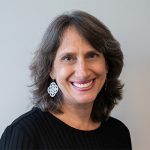 Marlene Schwartz featured in UConn Today discussing what cuts to school lunch and food bank programing means for children and families: https://today.uconn.edu/2025/06/cuts-to-school-lunch-and-food-bank-funding-mean-less-fresh-produce-for-children-and-families/
Marlene Schwartz featured in UConn Today discussing what cuts to school lunch and food bank programing means for children and families: https://today.uconn.edu/2025/06/cuts-to-school-lunch-and-food-bank-funding-mean-less-fresh-produce-for-children-and-families/
Author: Janice Berriault
Beth Russell recipient of Research Excellence Award
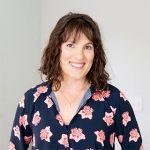 Congratulations to Beth Russell, recipient of this year’s InCHIP Community-Engaged Health Research Excellence Award. This award recognizes a faculty member who has demonstrated excellence in health-related research conducted in collaboration with one or more community organizations and consistent with the mission of InCHIP.
Congratulations to Beth Russell, recipient of this year’s InCHIP Community-Engaged Health Research Excellence Award. This award recognizes a faculty member who has demonstrated excellence in health-related research conducted in collaboration with one or more community organizations and consistent with the mission of InCHIP.
Na Zhang receives Junior Faculty Research Award
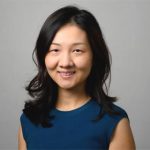 Congratulations to Na Zhang, recipient of this year’s InCHIP’s Junior Faculty Research Excellence Award! This award recognizes a pre-tenure InCHIP-affiliated faculty member who has made significant scientific contributions in a health-related domain consistent with the mission of InCHIP.
Congratulations to Na Zhang, recipient of this year’s InCHIP’s Junior Faculty Research Excellence Award! This award recognizes a pre-tenure InCHIP-affiliated faculty member who has made significant scientific contributions in a health-related domain consistent with the mission of InCHIP.
Rudd Center celebrates 10th anniversary at UConn

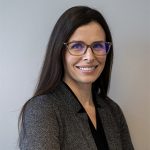
Rudd Center featured in UConn Today: https://today.uconn.edu/2025/05/rudd-center-celebrates-10th-anniversary-at-uconn/
Cindy Van Fleet, HDFS Alumni Spotlight, June 2025
 I entered UConn in Fall 1975 majoring in Home Economics Education. During my time at UConn not only did I get an excellent education, but I also met my husband. I loved my coursework, especially the classes in the Child Development and Family Relations (CDFR) department, which eventually become HDFS. When it came time for student teaching I knew without a doubt I had made the right decision. My job search took me right back to where I started, and I was hired as a Home Economics teacher at my alma mater, Platt High School, in Meriden CT. I earned my Masters Degree from UConn a few years later. In 2005 I had the opportunity to become part of the early piloting of HDFS 190 (which later became HDFS 1070) as part of the Early College Experience program. This experience changed the whole direction of my career in a very positive, fulfilling way. In 2008 I was in the “right place at the right time” and was offered the chance by Kathy Brophy to teach a summer session of the course at the Waterbury campus. This first opportunity grew into teaching the course during fall and spring semesters, not only in Waterbury, but also Torrington and Hartford. I taught evening and late afternoon classes for the next ten years, traveling to different campuses after a full day at Platt. My hope was that the adjunct position would continue after I retired.
I entered UConn in Fall 1975 majoring in Home Economics Education. During my time at UConn not only did I get an excellent education, but I also met my husband. I loved my coursework, especially the classes in the Child Development and Family Relations (CDFR) department, which eventually become HDFS. When it came time for student teaching I knew without a doubt I had made the right decision. My job search took me right back to where I started, and I was hired as a Home Economics teacher at my alma mater, Platt High School, in Meriden CT. I earned my Masters Degree from UConn a few years later. In 2005 I had the opportunity to become part of the early piloting of HDFS 190 (which later became HDFS 1070) as part of the Early College Experience program. This experience changed the whole direction of my career in a very positive, fulfilling way. In 2008 I was in the “right place at the right time” and was offered the chance by Kathy Brophy to teach a summer session of the course at the Waterbury campus. This first opportunity grew into teaching the course during fall and spring semesters, not only in Waterbury, but also Torrington and Hartford. I taught evening and late afternoon classes for the next ten years, traveling to different campuses after a full day at Platt. My hope was that the adjunct position would continue after I retired.
When I retired in 2018 from a 39-year teaching career at Platt High School I knew I wasn’t done! I planned to continue my adjunct teaching, but I was afraid that 1 or 2 courses might not be enough, so I reached out to the University of Saint Joseph and have been teaching for them as well! Although my time at UConn must come to an end due to our planned move out of state, I am not ready to stop teaching! I have been offered an online course at USJ and have made a connection with a university near our new home as I am still not done! I met with the department chair recently and I am hopeful that I will be offered an adjunct position there.
It has been our plan for many years to move somewhere warm after we retired. After visiting different places, we decided upon Murrells Inlet, South Carolina, where we are currently building a home. After living in CT and raising our three children here it was not an easy decision, but the warmth of the south calls us. Our kids live around the country – San Francisco, Chicago, and Charleston. We have 3 young grandchildren whom we adore and make every effort to visit once a month in Chicago!
In my free time, I love to read, sew, and plan the next visit to see the grands! My husband and I also enjoy traveling and have several trips coming up. My favorite vacation is anything involving the beach, so our move to South Carolina will make me feel as if we are on vacation all the time!
Huda Akef, HDFS Grad Student Spotlight, June 2025
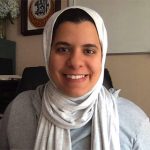 Huda Akef is a PhD candidate planning to defend her dissertation and graduate in Summer 2025. Before finding her way to HDFS, she started her academic journey with a B.S. in Electronics Engineering with a minor in Computer Science from the American University in Cairo. After working as an engineer for a telecom operator in Egypt for a few years, her emerging interest in the social sciences led her to a renewed academic path in the US. She completed a Master of Education in Human Development and Psychology at the Harvard Graduate School of Education. While applying for PhD programs the following year, she worked as a research assistant in the Social Learning Lab in the Psychology Department at Stanford University, contributing to studies investigating how children’s social interactions shape their learning.
Huda Akef is a PhD candidate planning to defend her dissertation and graduate in Summer 2025. Before finding her way to HDFS, she started her academic journey with a B.S. in Electronics Engineering with a minor in Computer Science from the American University in Cairo. After working as an engineer for a telecom operator in Egypt for a few years, her emerging interest in the social sciences led her to a renewed academic path in the US. She completed a Master of Education in Human Development and Psychology at the Harvard Graduate School of Education. While applying for PhD programs the following year, she worked as a research assistant in the Social Learning Lab in the Psychology Department at Stanford University, contributing to studies investigating how children’s social interactions shape their learning.
Huda’s interest in parenting in different cultural contexts drew her to the UConn HDFS PhD program to work with Dr. Charles Super and Dr. Sara Harkness. Recognizing the scarcity of research on Egyptian and Arab families, she designed and implemented a qualitative study to explore child rearing, parenting practices, and parent-child relationships in an upper middle-class community in Cairo, Egypt, while working on her project for the Culture, Health, and Human Development (CHHD) certificate. Building on her analysis of the interview data, she developed her research interests further and gained deeper understanding of how religion informs parenting, shapes family life, and intertwines with culture. Her interest in the intersection of research on religion and families, specifically in understudied Majority World populations, drew her to scholarship from different social science disciplines. In her dissertation, she’s critically examining how religion has been studied in relation to families utilizing a decolonial lens, in addition to examining how religion shapes parental ethnotheories and family life through her interview data with Muslim Egyptian parents. While working on her dissertation, Huda is also working part time at the Social Research Division at Employment and Social Development Canada. As part of a team focusing on disability and accessibility, she’s working on quantitative research projects examining the experiences of persons with disabilities in Canada using national datasets such as the Canadian Survey on Disability and the General Social Survey.
Outside of her academic and work life, Huda enjoys walking with her dog Anisa, listening to many podcasts and audiobooks, watching TV shows, taking on occasional woodworking projects, and tending to her plants indoors in the winter or in her balcony garden over the summer.
Marlene Schwartz, HDFS Faculty Spotlight, June 2025
 Marlene Schwartz is a Professor in HDFS and Director of the Rudd Center for Food Policy and Health. She grew up Columbia, Maryland and graduated from Haverford College in Pennsylvania with a BA in Psychology in 1988. After college she moved back to Maryland and worked for two years as an RA in Marion Radke-Yarrow’s lab at the National Institute of Mental Health.
Marlene Schwartz is a Professor in HDFS and Director of the Rudd Center for Food Policy and Health. She grew up Columbia, Maryland and graduated from Haverford College in Pennsylvania with a BA in Psychology in 1988. After college she moved back to Maryland and worked for two years as an RA in Marion Radke-Yarrow’s lab at the National Institute of Mental Health.
In 1990, Marlene moved to New Haven to begin graduate school in Clinical Psychology at Yale. Her first two years, she worked with Edward Zigler and participated in the Bush Center for Child Development and Social Policy. In her third year, she began working with Kelly Brownell and shifted her focus to the clinical treatment of eating disorder and obesity. She completed her pre-doctoral clinical internship at the Substance Abuse Treatment Unit at the Yale School of Medicine.
In 1996, Brownell hired Marlene as the Co-Director of the Yale Center for Eating and Weight Disorders, where she provided treatment for adults and children, and supervised graduate student and post-doctoral trainees. In the early 2000’s, there was a notable increase in the number of children with obesity who were presenting at the clinic. Marlene delivered family-based obesity treatments, but increasingly felt like her efforts to help families were undermined by the unhealthy food environment. She saw the power of food marketing and the lack of healthy options in schools as significant obstacles for her patients and decided to shift her research focus to documenting the poor nutritional quality of children’s cereals, restaurant “children’s meals,” and school food. Concurrently, her own children were in preschool and elementary school, so she also got involved as a parent in trying to make changes in these settings.
In 2006, Kelly Brownell asked Marlene to be the Deputy Director as he founded the Rudd Center for Food Policy and Obesity. Marlene’s research focused on improving school nutrition environment. She collaborated with the Connecticut State Department of Education to assess school wellness policies and advocated for the 2006 law to remove beverage vending machines from schools. She developed an online Wellness School Assessment Tool (www.wellsat.org), which helps school districts comply with USDA regulations and has been used to code thousands of policies since 2010. Michelle Obama’s Let’s Move initiative provided new opportunities to contribute to the national conversation, including a visit to the White House to celebrate the regulations that emerged from the Healthy Hunger-Free Kids Act.
In 2013, Marlene became the Director of the Rudd Center and in 2015, the Rudd Center moved to UConn to join InCHIP and set up offices in Hartford. Marlene joined HDFS where she teaches an undergraduate course, “Food and the American Family.” She continues to study school wellness policies and has expanded this work in collaboration with her Neag colleague, Sandy Chafouleas, to consider the whole child. She also has a second line of research on how to improve nutrition in the food banking system, which was inspired by her experience as a board member of the Connecticut Food Bank. Through this work she has developed an app that helps food bankers assess and track the nutritional quality of their inventory. Looking back, her favorite projects are ones that combine research, advocacy, and creating practical, data-driven tools for use in the field.
Research by Alyssa Clark and Eva Lefkowitz highlighted in media
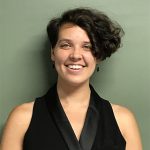
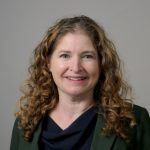
Alyssa Clark (PhD ’23) and Eva Lefkowitz’s research on associations of sexual and affection behaviors and sexual with relationship and sexual satisfaction was highlighted recently in the media:
Alum Sarah McKee accepts position as Nutrition Specialist
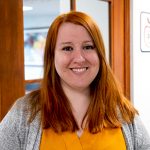 Congratulations to Sarah McKee (PhD ’23), who just started a position as Nutrition Specialist at the Food Bank of Western Massachusetts!
Congratulations to Sarah McKee (PhD ’23), who just started a position as Nutrition Specialist at the Food Bank of Western Massachusetts!
Marketa Burnett presents at CAIS Spring Leadership Conference
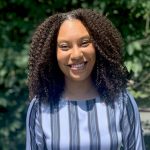 Marketa Burnett led a session entitled “Disrupting the system(s): Empowering Black Girls in Education” for school leaders at the Connecticut Association of Independent Schools (CAIS) Spring Leadership Conference on April 28th.
Marketa Burnett led a session entitled “Disrupting the system(s): Empowering Black Girls in Education” for school leaders at the Connecticut Association of Independent Schools (CAIS) Spring Leadership Conference on April 28th.